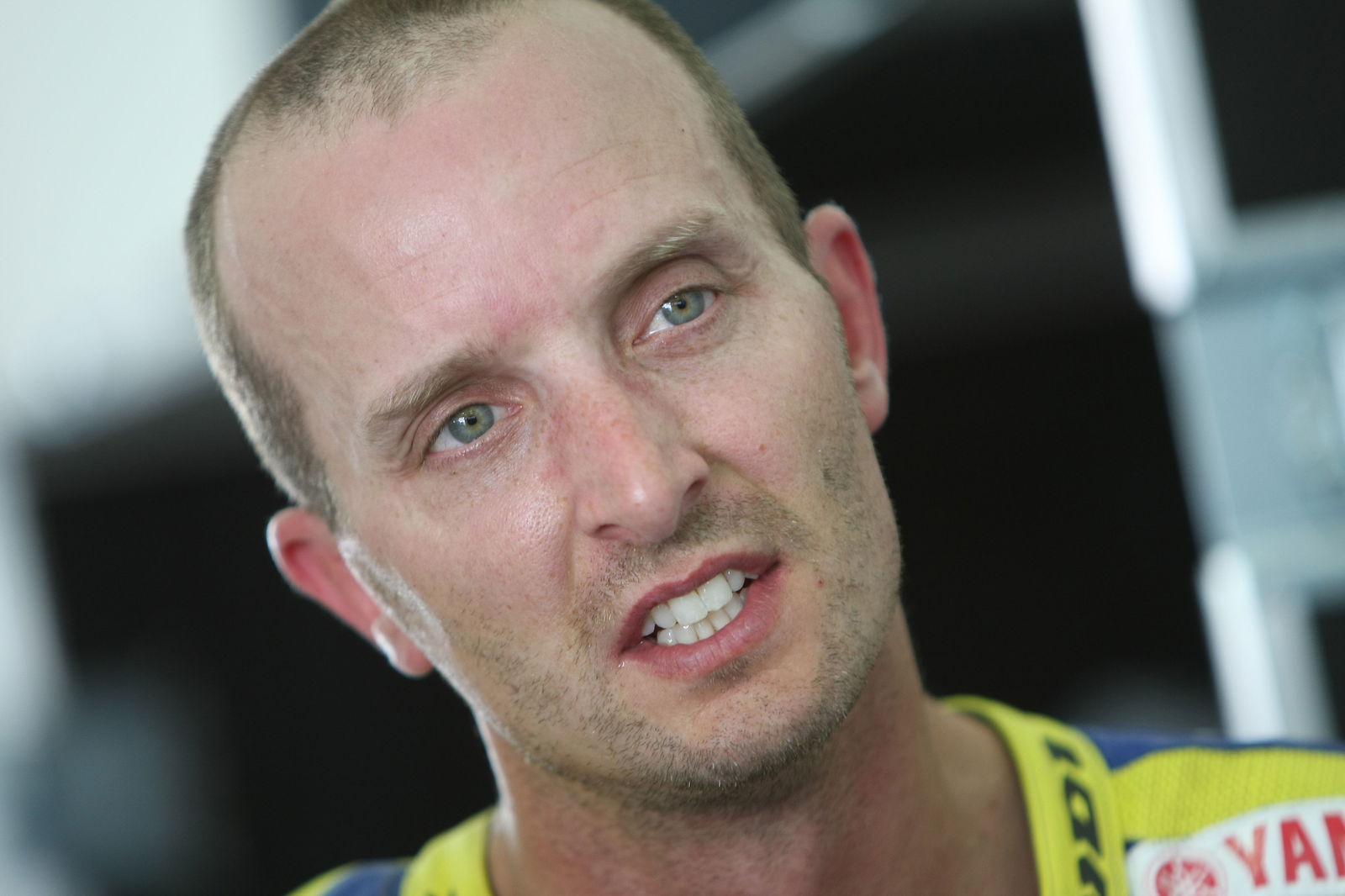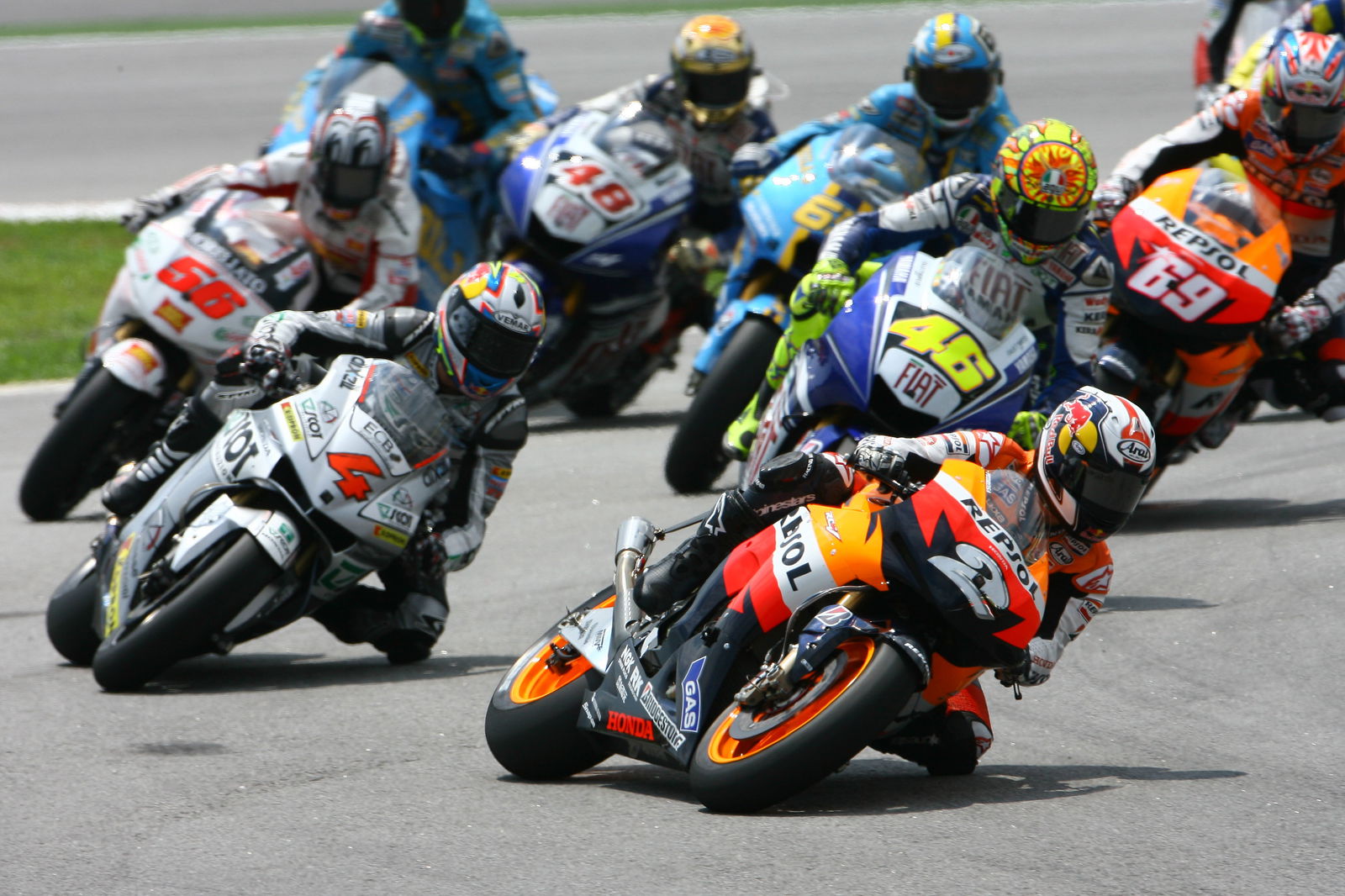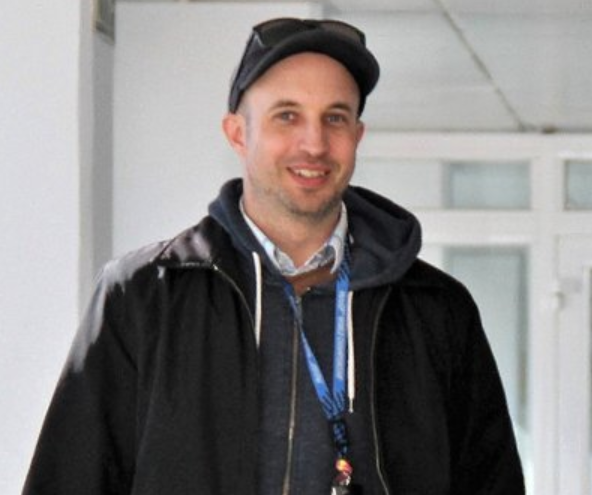Q&A: Paul Denning (Team Suzuki).
Team Suzuki were the revelation of the recent Sepang MotoGP test, with Loris Capirossi inside the top three on all three days - and fastest of all on day one - while team-mate Chris Vermeulen kept both GSV-Rs within the top six.
Capirossi left Malaysia with a best lap time of 2min 1.262sec, which was just 0.219sec slower than Ducati's Casey Stoner and only 0.125sec behind Yamaha's reigning world champion Valentino Rossi, with Vermeulen's quickest a 2min 1.666sec.

Team Suzuki were the revelation of the recent Sepang MotoGP test, with Loris Capirossi inside the top three on all three days - and fastest of all on day one - while team-mate Chris Vermeulen kept both GSV-Rs within the top six.
Capirossi left Malaysia with a best lap time of 2min 1.262sec, which was just 0.219sec slower than Ducati's Casey Stoner and only 0.125sec behind Yamaha's reigning world champion Valentino Rossi, with Vermeulen's quickest a 2min 1.666sec.
To put those times into further perspective, Capirossi's best lap in last October's Malaysian Grand Prix was a 2min 2.927sec set on his way to seventh, with Vermeulen recording a 2min 3.371sec on his way to ninth.
Significantly, Capirossi also completed a 19 lap race simulation on the final day, just two laps short of a full GP distance, with highly impressive results: Capirossi finished those 19 laps - which Denning reveals were deliberately done using the 'worst' tyre compound - in 38min 49.502sec, with an average lap time of 2min 2.605sec.
If one more average lap is added, it can then be compared with Capirossi's race time from the grand prix (after removing the first lap due to the standing start).
2009 Sim: 38min 49.502secs + 2min 2.605sec = 40min 52.107sec (20 laps)2008 Race: 43min 21.943sec - 2min 11.162sec = 41min 10.781sec (20 laps)Improvement: 41min 10.781sec - 40min 52.107sec = 18.674sec
Naturally all bikes have improved in the three and a half months since the race, but for reference Capirossi finished 15.936sec behind winner Valentino Rossi after 21 laps in October's grand prix.
Only two riders joined Capirossi in recording at least 19 consecutive fast laps at the test: Tech 3 Yamaha's Colin Edwards on day two (19 laps) and Fiat Yamaha's Jorge Lorenzo on day three (20 laps). Edwards completed his 19 laps in a time of 39min 3.679sec, while Lorenzo's first 19 were done in 38min 49.932sec.
After Sepang, Crash.net spoke to Suzuki team manager Paul Denning to find out how a tough 2008, when the GSV-R took just three podiums, had been transformed into such a promising start to 2009...
Crash.net:
The Sepang test seemed to go very well for Suzuki. Both Loris and Chris indicated that the bike had made a big step forward in all areas, with the possible exception of the engine. Is that how you saw it?
Paul Denning:
Actually I don't think you could say the engine was the exception, because the motor side has also seen a significant improvement since Valencia last year. Although if the riders were looking for one area of additional improvement then that would probably be it, a little more top power and top speed. But the engine character, torque, acceleration has been dramatically improved since the Valencia race and the riders would agree with that.
Overall the test couldn't have gone better. We had excellent durability, did a lot of laps with both riders and both had a great lap time potential. Loris' best lap on day three was set with used tyres from the day before. He did a long run on the soft rear tyre, which was the worst option - we did that deliberately to check the durability - and he did it at 3.00pm when the track was at its hottest.
So overall it couldn't have gone better in terms of improvement in pace compared to the race, which was only in October, and in very similar conditions. The track temperature for Loris' long run was actually the same as in the race. We went a lot quicker overall and the ultimate lap time was also a lot quicker.
We're very pleased. The bike has changed a lot and all the changes have gone in the right direction, so we're very happy.
Crash.net:
2008 was the first time since you took over as team manager that the results took a step backwards, did you sit down and look at the situation at the end of last season and decide on the changes that have put you in such a promising position?
Paul Denning:
The technical direction at the very start of 2008 was a little bit unlucky. The initial feedback in November for the '08 bike was positive, but in fact certain things didn't work at other racetracks. We ended up at the first race re-introducing certain components from the 2007 machine to the 2008 bike.
Really once you're at that stage you've lost before you even start, because the riders haven't achieved the rhythm to compete at the front and they haven't achieved the confidence to push the bike to its limits because everything is constantly changing. You need a good baseline to work with and it just took a while to recover from that.
In the middle of the season, with some of the programmes we put in place, we started to get more competitive, but Loris' injury also knocked us back because he was unable to ride to the maximum for at least three or four races. That cost us as well.
So it's not a question of big changes since the end of last season, it was big changes gradually implement during the course of last season to put us back into a better position. And then take those errors, bad luck - whatever you want to call it - learn from it and move forward again.
The factory has also responded fantastically well. The bike was much better ever at Phillip Island than it ever had been before, when we went there at the end of November. The riders then requested a lot of other stuff, a fairly big wish list to bring to the Sepang test. I don't think they expected to get everything they requested, but they did.
Everything was a step in the right direction so we couldn't be happier with the factory's effort and their reaction to a difficult situation.
Crash.net:
So, despite the current economic conditions, would you say that Suzuki has actually increased its commitment to MotoGP?
Paul Denning:
There is pressure on all the teams to do well, both on the track and commercially, but the thing that helps you most commercially is results - in terms of brand image, marketing and sponsorship. Suzuki, despite the difficult economic conditions, is focussed on doing the absolute best that it can.
Of course there are budget pressures throughout all forms of motorsport, and Suzuki and MotoGP is no different, but the key thing is that it can, in a perverse way, even help because it means the factory are completely focussed on the priority and there is no wastage. Everything we do must have a clear and measurably benefit. At the moment that seems to work well.
Also there has been a restructuring within the factory, in terms of the grand prix project, with Mr Sahara becoming project leader and I think that has helped in terms of communication and development.
Crash.net
Going back to the engine, it sounds different from the old engine out on track due to the silencers, but can you give us some specifics regarding how it has improved?
Paul Denning:
The RPM is very similar, but it has got a little bit more horsepower everywhere. I would say that the biggest change to the engine side is that the power delivery is much smoother and it has got more torque and therefore more acceleration. So everything has been improved, but what is most important is that the riders feel confident to use 100% of what is there and are able to concentrate on using the maximum of the bike's potential. The engine character is helping with that, but riders always want more top speed.
Crash.net:
Finally Paul, what are your views on the cost cutting measures currently under consideration for MotoGP?
Paul Denning:
My personal opinion doesn't really matter because we've got to work together and accept the point of views of the factories, of Dorna and the private teams. We need to find solutions that work for everybody. Different manufacturers may have different priorities for cost cutting, but there's got to be an acceptance and a little bit of a fair balance in one's attitude, rather than just looking after individual requirements.
I think at the moment the suggestions for the short term, in 2009, are ok. I don't want to focus on it too much. Overall there will be a majority agreement, certain things will be implement and we will work within whatever the new restrictions and regulations are to do our best to keep improving. We'll have an input in the meetings, as Suzuki or Team Suzuki, but ultimately it'll be what it'll be and we'll just get on with our job.


